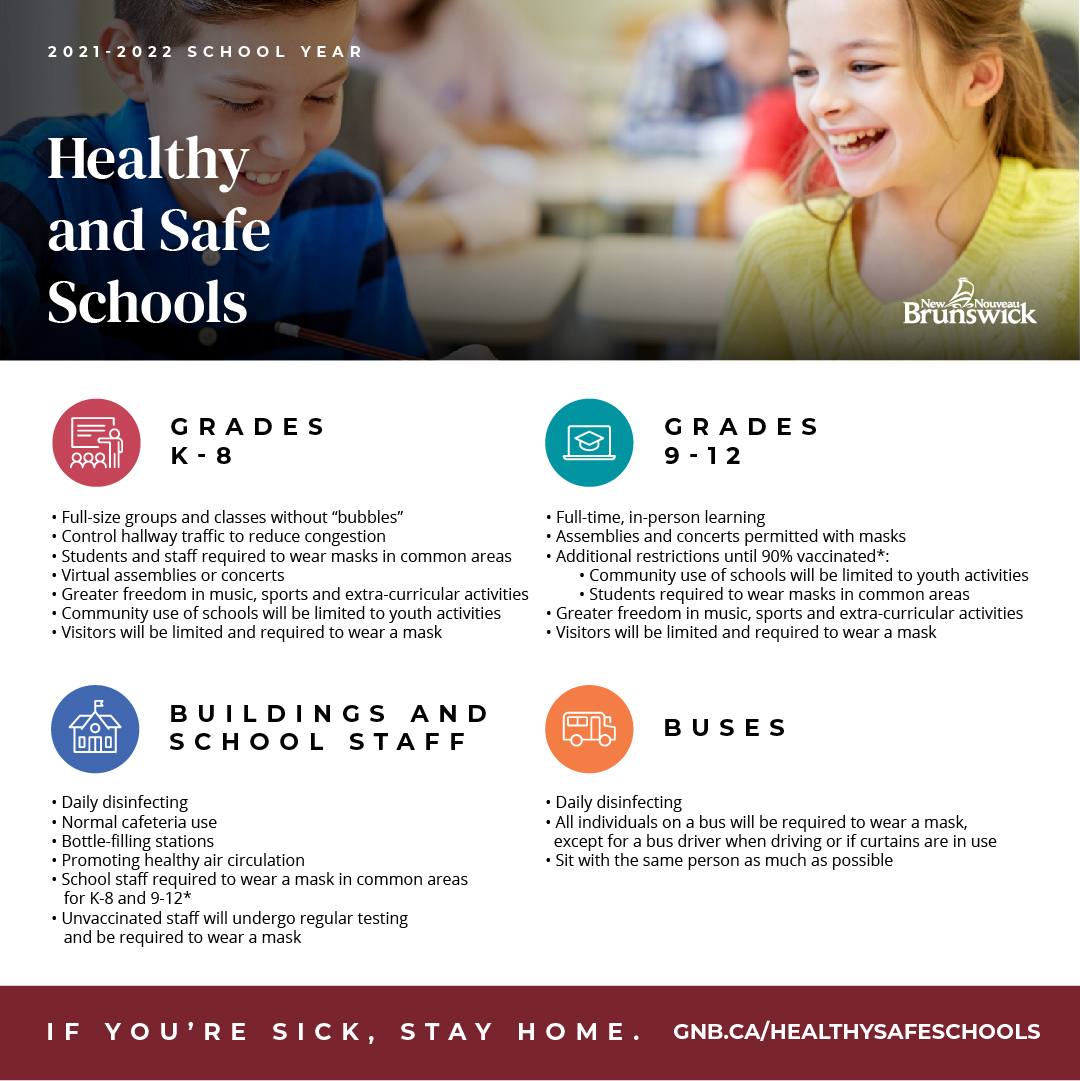New Brunswick is encouraging all schoolchildren to get tested over the winter break as the province announced its plans for schools and child-care facilities for the new year.

In a news conference Wednesday, Health Minister Dorothy Shephard announced 160 new cases of COVID-19 in the province and said 11 more cases of the Omicron variant have been confirmed, bringing the total number of Omicron variant cases to 14.
“However, seeing what is happening in jurisdictions around us, we know that there will be many more confirmed Omicron cases,” she said.
Shephard said children and teenagers are now the largest group of new daily infections, though the province plans to keep schools open throughout its three-level winter action plan. However, in Level 3, Public Health may choose to close schools on a case-by-case basis.
“It has been a challenge to slow the spread of the infection in this age group, but it’s very important for kids to be in school,” she said.
As of Wednesday, there were 61 schools actively impacted by COVID-19 cases.
Shephard said the province is initiating a “holiday testing blitz” where all school-aged children will be supplied with rapid testing kits to use over the winter holiday.

All children from kindergarten to Grade 6 will get two testing kits, with five tests per kit, while those in Grades 7 to 12 will get one kit.
“This will enable children and teens to do rapid testing every two to three days over the holiday break,” she said.

Get weekly health news
“These tests will help us quickly identify new infections and slow the spread.”
She noted that while the COVID-19 virus can be less severe in kids, “children can and do become seriously ill and require hospital treatment.”
“Even when their symptoms are mild, children can pass the virus to others, particularly the elderly whose immune systems may not be able to provide a full defence against its effects,” said Shephard.
‘Choosing the least worst outcome’
New Brunswick Education Minister Dominic Cardy said the province has been working to put together plans for schools and educational centres to slow the spread of COVID-19.
He said the province is going to continue to see cases in schools and early learning facilities, though he said students should remain in the classroom.
“This is about managing risks and adding layers of protection whenever possible,” he said.
“Dealing with COVID is ultimately making difficult choices, and often choices where neither are ideal, but simply choosing the least worst outcome.”
Cardy announced the province’s plans for schools and child-care facilities for all three levels of the winter action plan. The plans for early learning and child-care facilities will come into place on Monday and the plans for schools will come into effect when students return to class on Jan. 10.
Under the first level of the winter action plan – which is currently in effect – the following measures are in effect for schools:
- When a case is confirmed at a school, rapid testing will be expanded to include all students in kindergarten to Grade 8, non-vaccinated high school students, and any close contacts.
- Class groupings will be used for students in kindergarten to Grade 8.
- Masks will be required indoors.
- Masks will be required outdoors, with exceptions for kindergarten to Grade 8 students who are within their grouping.
- There will be limited singing and limited use of wind instruments.
- Visitors will be limited.
Level 1 measures for early learning and after-school child-care facilities include:
- Children will be in groups of no more than 20.
- Children aged two and under will not need to wear masks.
- Children aged three to five will need to wear masks when not in their group.
- Children five and older, as well as staff, will need to wear masks unless eating or drinking.
- Visitors will be limited.
- There will be limited singing and limited use of wind instruments.
Levels 2 and 3 will entail more stringent measures and the full plan can be found on the Government of New Brunswick website.
These measures are in addition to other measures announced on Monday, which include the prohibition of organized sports for children under 12 and K-6 students beginning their holiday break at the end of the school day on Dec. 17, one week ahead of schedule.
The last day of classes for students in Grades 7 and 8 will be on Tuesday, Dec. 21, and students in Grades 9 to 12 will be dismissed at noon on Thursday, Dec. 23.
New cases, vaccinations and hospitalizations
In a release, the province said that 82.4 per cent of eligible New Brunswickers are fully vaccinated against COVID-19 and 88.9 per cent have received their first dose. Just over 10 per cent have received a booster dose as well.
Shephard said during the briefing Wednesday that 31 per cent of those between age five and 11 have their first dose of the COVID-19 vaccine and 17,000 have appointments scheduled.
With the 160 new cases, as well as 70 recoveries, there are now 1,141 active cases of the virus. Forty-two people are in hospital, including 14 in intensive care. Six people are on a ventilator. The province said 24 people who are in hospital are over the age of 60 and there is no one under 19 hospitalized.
Of the new cases, 15 are in Zone 1 (Moncton region), 59 are in Zone 2 (Saint John region), 46 are in Zone 3 (Fredericton region), four are in Zone 4 (Edmundston region), four are in Zone 5 (Campbellton region), three are in Zone 6 (Bathurst region) and 29 are in Zone 7 (Miramichi region).









Comments
Want to discuss? Please read our Commenting Policy first.